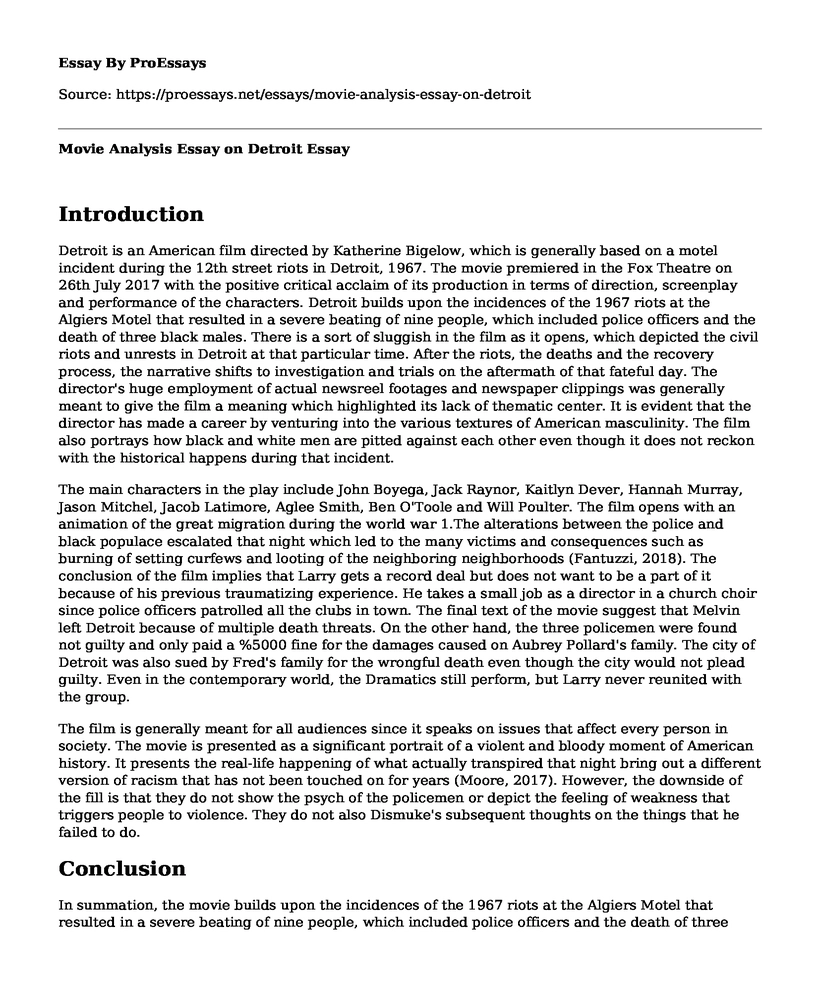Introduction
Detroit is an American film directed by Katherine Bigelow, which is generally based on a motel incident during the 12th street riots in Detroit, 1967. The movie premiered in the Fox Theatre on 26th July 2017 with the positive critical acclaim of its production in terms of direction, screenplay and performance of the characters. Detroit builds upon the incidences of the 1967 riots at the Algiers Motel that resulted in a severe beating of nine people, which included police officers and the death of three black males. There is a sort of sluggish in the film as it opens, which depicted the civil riots and unrests in Detroit at that particular time. After the riots, the deaths and the recovery process, the narrative shifts to investigation and trials on the aftermath of that fateful day. The director's huge employment of actual newsreel footages and newspaper clippings was generally meant to give the film a meaning which highlighted its lack of thematic center. It is evident that the director has made a career by venturing into the various textures of American masculinity. The film also portrays how black and white men are pitted against each other even though it does not reckon with the historical happens during that incident.
The main characters in the play include John Boyega, Jack Raynor, Kaitlyn Dever, Hannah Murray, Jason Mitchel, Jacob Latimore, Aglee Smith, Ben O'Toole and Will Poulter. The film opens with an animation of the great migration during the world war 1.The alterations between the police and black populace escalated that night which led to the many victims and consequences such as burning of setting curfews and looting of the neighboring neighborhoods (Fantuzzi, 2018). The conclusion of the film implies that Larry gets a record deal but does not want to be a part of it because of his previous traumatizing experience. He takes a small job as a director in a church choir since police officers patrolled all the clubs in town. The final text of the movie suggest that Melvin left Detroit because of multiple death threats. On the other hand, the three policemen were found not guilty and only paid a %5000 fine for the damages caused on Aubrey Pollard's family. The city of Detroit was also sued by Fred's family for the wrongful death even though the city would not plead guilty. Even in the contemporary world, the Dramatics still perform, but Larry never reunited with the group.
The film is generally meant for all audiences since it speaks on issues that affect every person in society. The movie is presented as a significant portrait of a violent and bloody moment of American history. It presents the real-life happening of what actually transpired that night bring out a different version of racism that has not been touched on for years (Moore, 2017). However, the downside of the fill is that they do not show the psych of the policemen or depict the feeling of weakness that triggers people to violence. They do not also Dismuke's subsequent thoughts on the things that he failed to do.
Conclusion
In summation, the movie builds upon the incidences of the 1967 riots at the Algiers Motel that resulted in a severe beating of nine people, which included police officers and the death of three black males. The conflicts between the police and black populace escalated that night which led to the many victims and consequences such as burning of setting curfews and looting of the neighboring neighborhoods. Katherine Bigelow's massive employment of actual newsreel footages and newspaper clippings was generally meant to give the film a meaning which highlighted its lack of thematic center. The film is generally intended for all audiences since it speaks on a significant portrait of a violent and bloody moment of American history.
References
Bigelow, Kathryn. Detroit. Aurum Producciones, 2017.
Crowdus, G., Boyd, H., Boyd, M. J., Corey, M., Jacques, G., Georgakas, D. & Massood, P. J. (2017). The Battle of the Algiers Motel: A Critical Roundtable on Kathryn Bigelow's" Detroit". Cineaste, 43(1), 10-16.
Fantuzzi, V. (2018). Detroit, a film by Kathryn Bigelow. La Civilta Cattolica, English Edition, 2(4), 73-76.
Moore, A. E. (2017). Three Days in Detroit: Kathryn Bigelow, tour guide. The Baffler, (37), 26-38.
Murray, R. (2011). Tough Guy in Drag? How the external, critical discourses surrounding Kathryn Bigelow demonstrate the wider problems of the gender question. Networking Knowledge: Journal of the MeCCSA Postgraduate Network, 4(1).
Cite this page
Movie Analysis Essay on Detroit. (2023, May 14). Retrieved from https://proessays.net/essays/movie-analysis-essay-on-detroit
If you are the original author of this essay and no longer wish to have it published on the ProEssays website, please click below to request its removal:
- Review of the Documentaries on Artists
- Essay Sample on Heavy Metal Music
- Jane Krakowski as Jacqueline White in Unbreakable Kimmy Schmidt Essay
- Paper Example on Creating an Effective Security Plan Using an Enterprise Architecture
- Paper Example on Comparing Art Design Culture in China and Malaysia
- Essay on Social Media: Enhancing Fire Dept. Operations in the Digital Age
- Essay Example on Outfits Global: Fashion & Design in Brooklyn, NY







